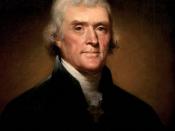The "revolution of 1800" made many Federalists wary, when Thomas Jefferson finally cut a deal to break the election tie, many Federalists questioned the future welfare of the country. After all, with Thomas Jefferson as president, wouldn't everything they had worked so hard for in the previous decade, be destroyed? Surprise and pleasure rippled through the country when Jefferson stated in his inaugural address "We are all republicans, we are all democrats." This well-known statement would later show its truth when Jefferson allowed his beliefs to become "federalized." Thomas Jefferson proved himself a political compromiser when he repeatedly broke his own belief system.
Thomas Jefferson had an egalitarian nature. He was the first president to allow members of the opposite party to be in his cabinet, fulfilling the positions of attorney-general, secretary of war, and postmaster genera. Obviously, this shows he allowed Federalist beliefs to impact his views. Jefferson was hypocritical though because although he originally believed all men were equal, he owned slaves.
He was willing to break his belief system as long as he would benefit from the changes.
Shortly after Jefferson won the election, major changes started to take place. Originally, Jefferson had planned to keep government post replacements to an all time low, but after discussing this with his lieutenants, Thomas Jefferson changed his policies to accept more removals. Then, in 1808, Thomas Jefferson passed the Embargo Act; this act did not allow the United States to import or export. The Embargo Act was not something to be expected from a Republican because it placed more power in the central government, something a Federalist would be more likely to do. Both the Embargo Act and Thomas Jefferson's quick decision to allow more removals were two examples of his likelihood to change his policies and...



I like it!
Its packed with interesting content and is a good quick read if you want to familiarize yourself with Jefferson and his beliefs on life.
2 out of 2 people found this comment useful.